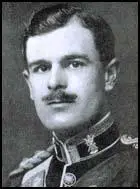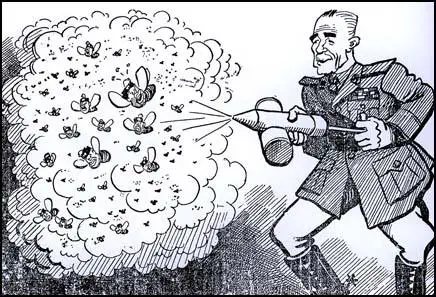Archibald Wavell

Archibald Wavell, the son of a general, was born in Colchester, on 5th May, 1883. Educated at Winchester School and Sandhurst Military Academy (where he graduated at the top of his class) he was commissioned into the British Army in 1901.
Wavell fought in the Boer War where he won five decorations. He also fought with distinction on India's North-West frontier. He was also an outstanding student at Camberley Military College.
On the outbreak of the First World War Wavell, now a brigade major, was sent to France as a member of the British Expeditionary Force. He won the Military Cross at Ypres but was badly wounded that resulted in the loss of his left eye. Later Wavell was transferred to the Palestine where he served under General Edmund Allenby as brigadier general staff of the 20th Corps.
Wavell remained in the British Army and in July 1939 he was given the task of creating the Middle East Command and protecting the Suez Canal and the oil reserves in the region from Nazi Germany. However, after the outbreak of the Second World War it was Italy who provided the most threat to this region.
Benito Mussolini sent over a million men in the Italian Army to Libya. Wavell, with only 36,000 men, was easily outnumbered. On 13th September, 1940, Marshall Rodolfo Graziani and five Italian divisions began a rapid advance into Egypt but halted in front of the main British defences at Mersa Matruh.
Wavell ordered a British counter-offensive on 9th December, 1940. The Italians suffered heavy casualties and were pushed back more than 800km (500 miles). British troops moved along the coast and on 22nd January, 1941, they captured the port of Tobruk in Libya from the Italians.
Adolf Hitler was shocked by the defeats being suffered by the Italian Army and in January 1941, sent General Erwin Rommel and the recently formed Deutsches Afrika Korps to North Africa. Rommel mounted his first attack on 24th March 1941, and after a week of fighting he pushed the British Army out of most of Libya. However, under General Leslie Morshead the British managed to hold vital forward supply base at Tobruk.
Wavell attempted a counter-attack on 17th June, 1941, but his troops were halted at Halfaya Pass. Although Wavell held in high esteem by General Alan Brooke, the Chief of General Staff, Winston Churchill had lost confidence in him and replaced him by General Claude Auchinleck.

Wavell was now appointed Commander-in-Chief of British troops in India. After Japan entered the war by bombing Pearl Harbor on 7th December, 1941, Wavell was sent to Burma to organize its defences against the Japanese Army. Once again easily outnumbered, when he did not get the necessary reinforcements, he resigned in February, 1942.
In January 1943 Wavell was promoted to the rank of field marshal. He returned to India where he attempted to organize the liberation of Burma. However, during the spring of 1943 his troops, led by General William Slim, failed in several attempts to drive the Japanese out of the area.
On 19th June, 1943, Wavell became viceroy of Burma and the following month was raised to the peerage as the 1st Earl of Cyrenaica. One of his first acts was to free Congress leaders from prison. He also worked hard at trying to resolve the Hundu-Moslem differences.
After being replaced as viceroy by Lord Mountbatten in 1947 Wavell returned to England and in 1949 became lord lieutenant of the County of London. Books by Wavell include The Palestine Campaigns (1928), Allenby (1940), Generals and Generalship (1941), Allenby in Egypt (1943) and The Good Soldier (1947).
Archibald Wavell died on 24th May 1950.
Primary Sources
(1) Winston Churchill, The Second World War (1950)
All our efforts to form a front in the Balkans were founded upon the sure maintenance of the Desert Flank in North Africa. This might have been fixed at Tobruk; but Wavell's rapid westward advance and the capture of Benghazi had given us all Cyrenaica. To this the sea-corner at Agheila was the gateway. It was common ground between all authorities in London and Cairo that this must be held at all costs and in priority over every other venture. The utter destruction of the Italian forces in Cyrenaica and the long road distances to be traversed before the enemy could gather a fresh army led Wavell to believe that for some time to come he could afford to hold this vital western flank with moderate forces and to relieve his tried troops with others less well trained. The Desert Flank was the peg on which all else hung, and there was no idea in any quarter of losing or risking that for the sake of Greece or anything in the Balkans.
At the end of February the 7th British Armoured Division had been withdrawn to Egypt to rest and refit. This famous unit had rendered the highest service. Its tanks had travelled far and were largely used up. Its numbers had shrunk by fighting and wear and tear Still there was a core of the most experienced, hard-bitten desert-worthy fighting men, the like of whom could not be found by us. It was a pity not to keep in being the nucleus of this unique organisation, and rebuild its strength by drafts of officers and men arriving trained, fresh, and keen from England, and to send up to them the pick of whatever new tanks or spare parts could be found. Thus the 7th Armoured Division would have preserved a continuity of life and been resuscitated in strength.
(2) Bernard Montgomery, The Memoirs of Field Marshal Montgomery (1958)
The major military problem in India was dependent on future political decisions. Wavell told me that he was convinced the British would have to hand over the country to the Indians; there had been no recruitment into the civil service and we could not continue to govern it much longer. He wanted to do it gradually, beginning in the south; the British Government wanted it done quickly. The Cabinet Mission was in Delhi at the time. I was concerned with the military repercussions of whatever plan was finally adopted. If developments resulted in civil disturbances, then the military would be faced with the task of safeguarding British lives and interests; in this connection the attitude of the Indian Army would be a factor of the greatest importance.
